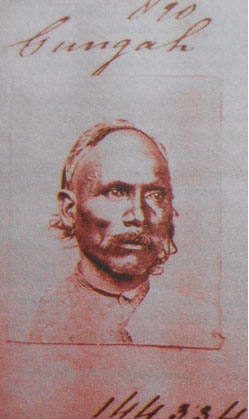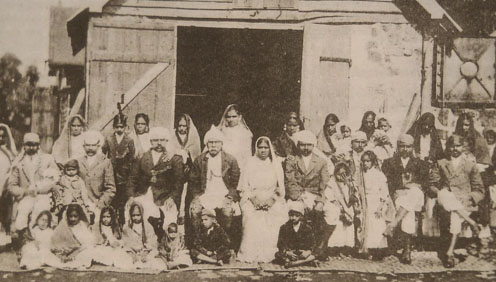The Gungah Family of Mauritius
 Gungah Fowdar , immigrant no 144,334 a Bihari born in the village of Runwanee, Arrah, disembarked in Mauritius from Calcutta on 29th September 1854. The 25 year old was indentured to Deux Bras sugar estate.
Gungah Fowdar , immigrant no 144,334 a Bihari born in the village of Runwanee, Arrah, disembarked in Mauritius from Calcutta on 29th September 1854. The 25 year old was indentured to Deux Bras sugar estate.
In 1866 he married a young Indian girl named Busmoteea, who had migrated to Mauritius with her parents from Ghazipur at the height of the troubles engulfing the region, during the Indian rebellion, in July 1857.
The following year a son was born, named Dookhee Gungah. In all the couple would have 8 sons. The family worked hard and managed to acquire a plot of land at New Grove.

A Gungah family portrait, c. 1912
Gungah's sons gradually enlarged the family landholdings. By 1920 the family possessed around 3,000 acres of land, and in 1931 the Société Dookhee Gungah owned no fewer than seven sugar cane plantations: La Rosa, Gros Bois, Constantin, Astroea and Quatre Soeurs, as well as a biscuit factory and a bakery.
 The acquisition of wealth and land brought prestige and social status, which carried with it, a sense of responsibility that was increasingly translated into acts of religious and cultural philanthropy.
The acquisition of wealth and land brought prestige and social status, which carried with it, a sense of responsibility that was increasingly translated into acts of religious and cultural philanthropy.
Dookhee Gungah donated large sums of money for the construction of temples and cremation grounds throughout the island of Mauritius.
He also founded the Gita Mandal in association with other wealthy Indians, including the Ramtohul family, which was set up to administer a number of Hindi schools in Mauritius.
Gungah financed the first Hindi publications to be printed on the island and after his death, in 1944, a government school was named in his honour.

Dookhee Gungah with a group of pandits after a religious ceremony
Dookhee Gungah’s philanthropy even extended to his ancestral village of Runwanee in Bihar, where he funded the building of a well for the local people. In so doing, Gungah and others like him prefigure the actions of modern-day South Asian communities overseas whose remittances and charitable acts continue to constitute valuable seed funding for their impoverished homelands.







